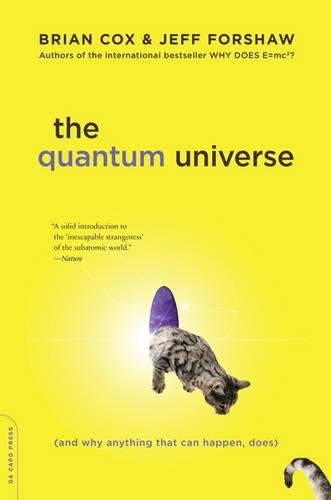 Reddit reviews The Quantum Universe: (And Why Anything That Can Happen, Does)
Reddit reviews The Quantum Universe: (And Why Anything That Can Happen, Does)
We found 6 Reddit comments about The Quantum Universe: (And Why Anything That Can Happen, Does). Here are the top ones, ranked by their Reddit score.

Da Capo Press
Not OP, but I highly recommend The Quantum Universe (Amazon link) as an accessible and really informative dip into quantum physics. I really wish I'd had this or something like it back when I was an undergrad.
As for the rest of physics that's written this well, I dunno. :)
This is tricky, because the broadly known explanation is misleading.
First the physics:
At the time Heisenberg was working on this, physicists were first figuring out experiments that could give them information and measurements about what the insides of atoms were like. And the measurements they were getting were very confusing. Everyone was trying to think up some clear mental model for what was going on, in order to help them figure out the math. Bohr had some success by thinking of the nucleus and the electron as being similar to a tiny planet and a moon orbiting around it. The problem was: his math broke down for any atom other than hydrogen, so clearly this wasn't the whole story.
Heisenberg's most important idea was something like "Give up trying to have a mental model or analogy to the everyday world, just get the math right no matter how strange it may seem and accept that's simply how things are."
Heisenberg made huge contributions to getting the math figured out. One of the things his math showed, was that certain measurements acted as as complementary pairs: the more you knew about one, the less you would know about the other. Position and momentum are the common example, but there are other pairings.
The obvious question is, why the heck should this be the case? Why does measuring momentum make us blind to position?
Enter the confusion: Heisenberg suggested that this paired measurement effect was because the act of observing was interfering with the system. This is called the observer effect, and it's commonly described with an example something like "well, to see an electron you have to bounce a photon off it, but by bouncing a photon off it you've hit it like a billiard ball, so your measurement of position changed it's momentum."
The problem is, this is just wrong. Electrons, photons and other subatomic particles do not move like billiard balls. The more refined the math got, the more certain this became. Matter acts like little waves of probability, and particles are in a sense a little bit everywhere at once.
It doesn't make sense to talk about an increasingly exact location of a particle. Not because we're affecting it by observing, and not because there's noise or error in our measuring device, but because past the plank scale, matter simply does not have an exact location.
So again, why this uncertainty in the pairs of measurement? Because that's a feature of the math that works for predicting reality. No one has come up with a better explanation since.
If it sounds a bit confusing and horrifying, you're not alone. Einstein was one of the most vocal opponents to this view, and even until his death maintained that we'd find better math eventually. We haven't, and generally speaking, particle physicists are just used to thinking this way now.
But again, outside of the physics world "Heisenberg's Uncertainty Principle" refers to the observer effect.
If you want a good short book on this stuff that won't punish you with the advanced math, I recommend this one by Brian Cox and one of his colleges: http://www.amazon.com/The-Quantum-Universe-Anything-Happen/dp/0306821443
> yet to see a persuasive argument against number two
Look up Bell's Inequality.
Or this: https://smile.amazon.com/Six-Not-So-Easy-Pieces-Einstein%C2%92s-Relativity/dp/0465025269/ref=sr_1_3
Or this: https://smile.amazon.com/Quantum-Universe-Anything-That-Happen/dp/0306821443/ref=sr_1_4
Virtually no math in these that Oz's Scarecrow couldn't understand.
I don't believe much, but I accept it as the best explanation for what we currently know about quantum physics.
Edit: Link for desktop: http://www.amazon.com/The-Quantum-Universe-Anything-Happen/dp/0306821443 (I had posted the mobile link before)
FOR SCIENCE!
http://www.amazon.com/The-Quantum-Universe-Anything-Happen/dp/0306821443/ref=sr_1_1?ie=UTF8&qid=1408573505&sr=8-1&keywords=brian+cox
The Quantum Universe is a good, rigorous, but well-explained book that might be along the lines you're looking for. Possibly also Reality is Not What it Seems, but I've barely started that one so I can't say for sure.